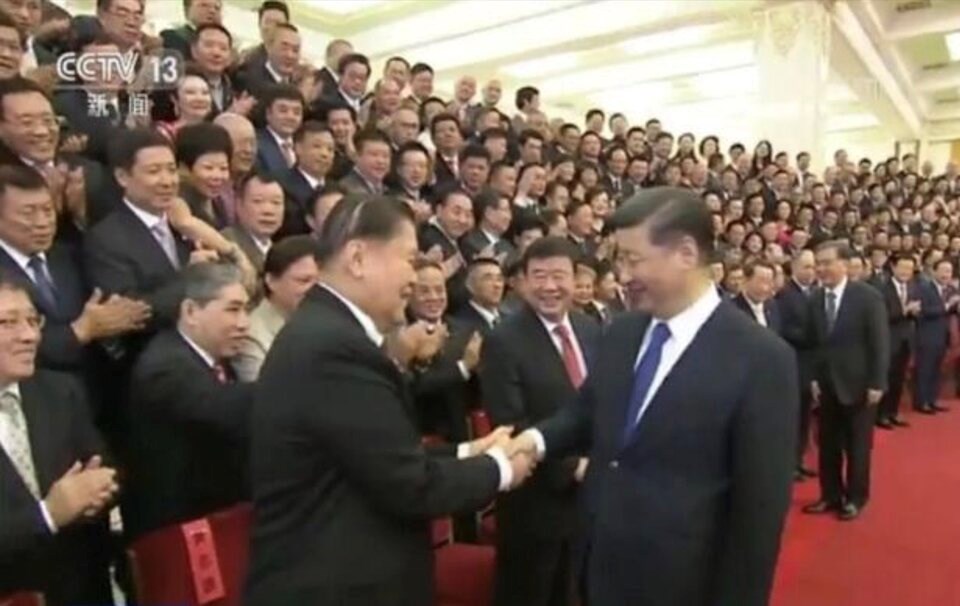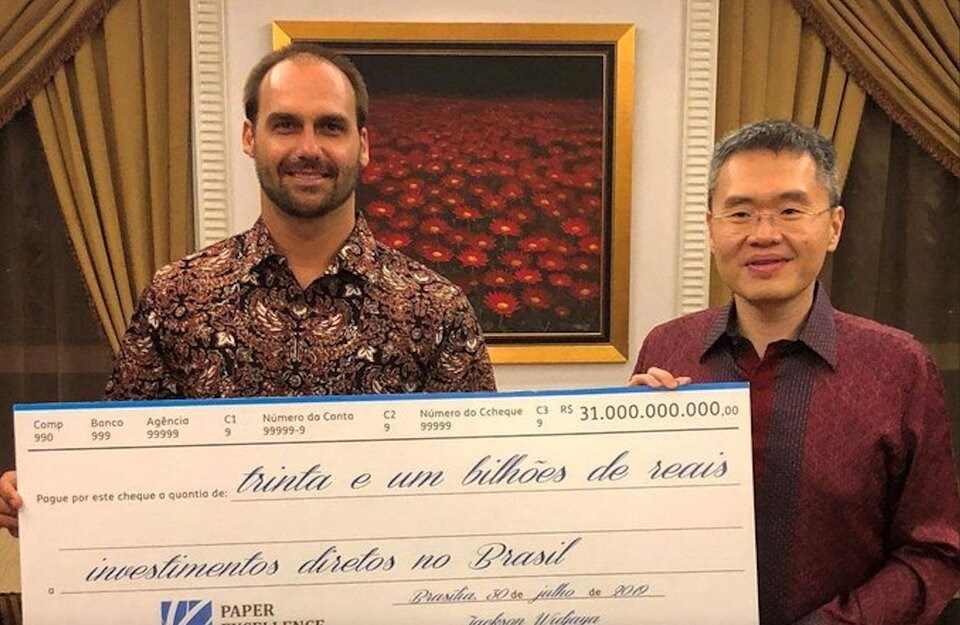The owner of Canada’s largest forestry company has moved to openly take control of a massive pulp and paper empire spanning Asia, the Americas and Europe.
Jackson Wijaya currently owns dozens of pulp and paper mills across Canada, the U.S., Brazil and Europe under the Domtar Group — formally known as Paper Excellence until it rebranded last month. Wijaya’s intention to take direct control over Asia Pulp & Paper (APP), an Indonesian and Chinese-based multinational currently owned by his father, was confirmed in an official notice from the European Commission.
For years, Domtar and APP have repeatedly denied any relationship with one another. Wijaya’s now open intention to control the two companies has raised questions among environmental watchdogs that have long claimed APP has exerted hidden control over Canadian forestry assets.
The announcement comes less than a week after Canada and Indonesia signed a free trade pact.
“It's a concern to us that they were denying it, and ultimately it's proven to be true,” said Priyanka Vittal, legal counsel for Greenpeace Canada.
“So what other things are they lying about? What are their motivations? It doesn't really create a trusting relationship with this company.”
A Domtar spokesperson said Wijaya’s father had appointed him to be the sole beneficiary and owner of APP as part of his “succession planning.”
“This appointment by his father was recently made and Jackson could not have foreseen the timing since this is the wish and decision of his father,” said Jennifer Johnson, Domtar’s vice-president of global communications.
“Importantly, Mr. Wijaya will not hold any leadership position within APP, and APP and Domtar will continue to operate as they always have — as distinct entities, each with its own management teams and governance structures.”
The growth of a forestry empire
APP has long been a target of environmental watchdogs over claims it is responsible for widespread deforestation, human rights abuses and conflicts with Indigenous communities. The company abandoned its U.S. operations in 2001 after it failed to pay creditors and defaulted on US$13.9 billion in loans — a record sum.
Less than a decade later, Paper Excellence emerged in Canada, and over the intervening years, began to buy up old mills across the Prairies, British Columbia and Nova Scotia.
By the time it rebranded in October, Paper Excellence had made a quick succession of unprecedented multibillion-dollar acquisitions, consolidating control over industry giants Domtar and Resolute Forest Products. The latter deal gave the company control of over 22 million hectares of Canadian forests and made Paper Excellence the largest forestry company in North America.
Canada’s Competition Bureau has repeatedly investigated and cleared Paper Excellence’s acquisitions.
Spokesperson Jayme Albert said in an email that the Competition Bureau cannot re-open previous investigations into Paper Excellence’s acquisition of Domtar, and later, Domtar's purchase of Resolute. That's because the one-year window to do so has already expired, he said.
The bureau was also unable to confirm whether it would review the proposed consolidation of Domtar and APP under Wijaya’s ownership.
“A huge concern is how the Canadian government regulators essentially handed over ownership to a notoriously private company that operates in an opaque way, [and] who's now directly linked to a company that's had a poor past environmental record,” Vittal said.
Under investigation, both companies deny links
The expansion of Paper Excellence's North American forestry empire caught the attention of lawmakers in the spring of 2023 after a journalistic investigation into the Richmond-based company’s overseas ties.
That investigation — which included Glacier Media and its media partners with the International Consortium of Investigative Journalists (ICIJ) — revealed numerous links between what was then Paper Excellence and APP.
As part of their initial investigation, ICIJ partners interviewed former employees and reviewed leaked emails suggesting staff worked freely between Paper Excellence and APP.
In several cases, communications show APP employees providing key strategic analyses in a Paper Excellence application to Chinese regulators.
Mac Anderson, a former employee who ran a Paper Excellence fibre supply company in B.C., described reporting to officials in Shanghai. Another former APP employee said pulp Paper Excellence exported from Canada acted as “a feeder for the Chinese machine.”
The ICIJ investigation also turned up several mortgages in B.C. and Saskatchewan with a curious link to the Chinese state. Over a decade ago, Paper Excellence secured US$1.25 billion in credit from the China Development Bank — an investment arm the Chinese government has used to purchase overseas infrastructure and build out its Belt and Road Initiative.

The ICIJ consortium of media outlets also used shipping records and satellite tracking technology to trace one of Paper Excellence’s pulp shipments from B.C. to Shanghai through an APP-linked logistics company.
After publication, the Asian conglomerate denied ever buying pulp “directly” from Paper Excellence. Both companies denied any links with one another.
Within weeks, Canada’s Standing Committee on Natural Resources launched its own investigation into Paper Excellence. Testimony from company officials stated it had paid off all of the loan debentures by 2020 and was free of any Chinese debt. But Wijaya declined multiple requests to testify before the committee and has yet to answer questions.
On May 30, 2023, John Williams, non-executive chairman of the board for the Paper Excellence Group, told the committee that nobody who worked for him had interactions with anyone from APP. He said he continues to compete “pretty aggressively” with the Asian conglomerate in the North American paper market.
“So the idea that they would be the puppet masters, I have to say, seems inconceivable,” said Williams.
Environmental groups warn APP exerts 'significant power' over Canadian company
Since then, environmental groups have continued to pursue official recognition that Paper Excellence is in a “relationship of control” with APP.
In 2007, the Forest Stewardship Council (FSC) disassociated with APP as a result of “destructive forestry practices.” In the years since, several environmental groups have brought forward evidence in an attempt to seek recognition Paper Excellence was ostensibly the same company as APP, and should therefore also have its green certificates revoked — something that could cost the company significant market share.
In November 2023, Greenpeace Canada and Indonesian group Auriga Nusantara filed a complaint with the FSC citing “strong evidence” Paper Excellence is a “sister company” of APP. The complaint points to the ICIJ investigation and to research Auriga and Greenpeace said shows “strong indications” APP's parent company, Sinar Mas, has 'significant power' over Paper Excellence.”
The 2022 report, suggests a nexus of connections linking the two companies. Among them, Jackson Wijaya was found to have held key management positions in APP China while maintaining his position as owner of Paper Excellence.
The FSC hired the Canadian law firm McMillan LLP to carry out an “independent third-party” review of any potential linkages between the two companies. In May 2024, the group said it had found no corporate control between the companies.
The two environmental groups slammed the decision and criticized the FSC’s choice to hire McMillan as an independent third party. They noted the law firm has held Paper Excellence as a client for several years, facilitating multibillion-dollar acquisitions and appearing to represent the company to the Canadian federal government on “anti-trust issues where its relationship with APP was being examined.”
Green certificate body 'evaluating' implications of Wijaya's open corporate control
On Wednesday, the FSC said it had been informed Wijaya was becoming the beneficial owner of the rebranded Domtar and APP.
“We are evaluating what the implications of the two companies being owned by one individual will mean for our policy for association,” read a statement from the FSC. “To determine the potential consequences of this change in ownership, a rigorous legal review of relevant company connections will be initiated.”
FSC has been in negotiations with APP since 2013 on how the company can regain association with the green credentials body.
In its statement Wednesday, the FSC said Domtar was a company in “good standing” with the accreditation body. It also noted that in early 2024, APP took steps to remedy the damage it had done to the environment and people.
In an email, Johnson said Domtar is “engaging directly and cooperatively with FSC” to ensure Wijaya’s ownership of APP doesn’t impact the company’s certification.
“There are a lot of uncertainties at this point in time,” said Vittal. “We’re just going to have to wait and see how the Canadian government holds them accountable.”
Editor's note: This story has been updated to reflect comments from the Domtar Group and Canada's Competition Bureau.




